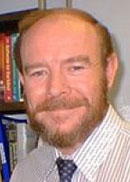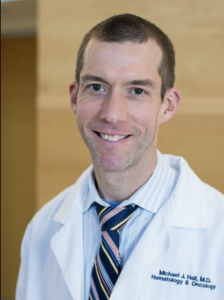 Linda Fleisher, PhD
Linda Fleisher, PhD
Associate Research Professor – Health Disparities and Health Communication, Fox Chase Cancer Center
In recent years, Dr. Fleisher has focused much of her programmatic and research efforts on Digital Health – from design, user testing, and usability to implementation and evaluation. She has contributed to a number of web and mobile health research studies and is currently the Principal Investigator of a study to test multilingual text messages to improve mammography screening among underserved populations. Dr. Fleisher’s research has bridged the fields of health communications and public health, with an emphasis on consumer informatics, health disparities, health education/communication interventions, and community-participatory and dissemination research.
Tom Gordon, PhD
Professor of Psychology, University of Massachusetts- Lowell
Dr. Gordon has had extensive experience conducting research studies involving a variety of research approaches, with particular emphasis on perceptual mapping, for such clients as: ABC Television Network; World News Tonight program; ABC Spot Sales Division; and numerous national corporations. For the past decade he has concentrated on health research and the use of perceptual mapping and segmentation approaches to develop more effective health campaigns. Much of this research has involved working with low-income, low-health-literacy minority communities and has successfully produced tutorials and message strategies that are culturally and developmentally appropriate for these target groups. These studies have covered diverse areas of application including colorectal cancer screening, radiological terror, smallpox vaccination, avian flu attitudes toward vaccination and quarantine, public perceptions of emergency preparedness, and perceptions of patients by HIV/AIDS caregivers.
Amy B. Jessop PhD, MPH
Director of Research at Prevention Point Philadelphia
Dr. Jessop’s work focuses on the prevention, screening and treatment of infectious diseases, particularly vaccine-preventable infections and viral hepatitis. She is a founder and Director of HepTREC, a community-based organization with a mission to reduce the impact of viral hepatitis. She approaches viral hepatitis and its associated issues of substance use, liver diseases, health disparities and health policy through advocacy, community-based programs, and research. Dr. Jessop’s research is focused in two major areas: (1) immunization policies and practices, and (2) improvement of health service access and delivery. Health service improvement research includes examination of adoption and implementation of clinical practice guidelines. Immunization-related projects examined immunization registries laws and statutes, subspecialty physician immunization practices, readiness of VFC providers to implement vaccination recommendations, and Hispanic parents’ attitudes and beliefs about HPV vaccination of girls. Hepatitis-related projects examined infection prevention policies and practices in police departments, descriptive epidemiology of viral hepatitis in Philadelphia’s methadone maintenance programs, barriers to prevention and care for viral hepatitis, identification of readiness factors for viral hepatitis treatment, and development of mHealth tools to improve hepatitis C treatment initiation.
Jae Sevelius, PhD
Professor of Medical Psychology, Department of Psychiatry, Columbia University
Dr. Jae Sevelius is a licensed clinical psychologist and Professor of Medical Psychology within the Department of Psychiatry at Columbia University. With funding from the National Institutes of Health and the California HIV/AIDS Research Program, their research is focused on leveraging data to develop culturally relevant, transgender-specific programs and interventions to promote holistic health and wellness among transgender people, with an emphasis on serving transgender women of color and those affected by HIV. Dr. Sevelius is currently co-PI with Dr. Bass on the NIMH study looking at perceptions of PrEP in at-risk transgender women in Philadelphia and San Francisco. Dr. Sevelius is Co-Investigator on several transgender-focused projects, including a national demonstration project testing interventions to engage and retain HIV+ transgender women of color in care (PI: G. Rebchook), and formative research with transgender women in Brazil (PI: S. Lippman). Maintaining a focus on community collaboration and trauma-informed intervention development, they seek to develop and evaluate health promotion programs for transgender people that empower and draw on inherent strengths in the communities they serve.
Michael Hall, MD, MS
Director of the Department of Genetics, Fox Chase Cancer Center
Dr. Michael Hall is a GI oncologist and a clinical cancer geneticist, and has found over the years that his strongest skills are in helping his patients and their families to understand the complicated risks of cancer screening, surgery and treatment, to weigh the different options for treatment, and finally to develop a plan that is both in line with cutting edge research but also with their personal needs and preferences for their health and their lives. In cancer medicine, there is no longer a one size fits all approach, and in his practice, Michael strives to build on his patients’ unique strengths and to further bring the multi-faceted expertise of his colleagues at Fox Chase and his colleagues nationally to offer each of his patients the best care he possibly can.
Marne’ Castillo, MEd, PhD

Project Director of Connect to Protect in the Division of Adolescent Medicine at Children’s Hospital of Philadelphia.
Dr. Castillo’s work focuses on adolescent health promotion and community engagement in research, especially with the House and Ball and Kiki communities. She also has broader interests around social determinants of health, with a special interest in trauma and improving outcomes for marginalized adolescents. In 2015, Dr. Castillo received the Center for AIDS Research Red Ribbon Award recognizing her work on behalf of adolescents in the field HIV prevention research in Philadelphia. She has served on the Board of Directors of several organizations, including Philadelphia FIGHT and GALAEI. Dr. Castillo received her PhD in public health and her master’s degree in education from Temple University.
Marla Davis Bellamy, JD, MGA

Director of Philadelphia Ceasefire
Marla Davis Bellamy is the director of Philadelphia CeaseFire at Temple University. She has served as executive director of Temple’s Center for Minority Health and Health Disparities and the co-director of the Center for Bioethics, Urban Health, and Policy. Prior to joining Temple, Ms. Davis Bellamy was the executive director of the Anti-Violence Partnership of Philadelphia and served for five years as chief of staff of the Pennsylvania Department of Health. Marla earned a law degree at Temple University, a master of government administration degree from the University of Pennsylvania and a bachelor’s degree in communications from Johnson C. Smith University.
Beth Pfeiffer, MS, PhD

Director of the REACH (Research, Engagement and Advocacy for Community Participation and Health) Lab
Dr. Pfeiffer is the director of the REACH (Research, Engagement and Advocacy for Community Participation and Health) Lab, which is focused on outcome-based research related to areas that impact community participation and health for people with autism spectrum disorder (ASD) and/or intellectual and developmental disabilities (IDD). Specifically, her research focuses on the development of interventions and outcome measures to support engagement in meaningful activities in the community with a focus on transportation and employment. In all aspects of her work, she engages stakeholders in research planning and decision-making and is committed to building and maintaining strong relationships with community partners. In addition to teaching and research, Dr. Pfeiffer maintains her clinical practice in the area of pediatrics.
Viraj V. Patel, MD, MPH

Associate Professor, Department of Medicine (General Internal Medicine) Albert Einstein College of Medicine
Viraj Patel, MD, MPH, Associate Professor of Medicine, is a clinician-investigator in the Division of General Internal Medicine and on faculty in the Primary Care/Social Internal Medicine residency program. His research centers around innovative community engaged approaches to HIV prevention with sexual minority men and gender minority communities in the U.S., India, and Rwanda. His current research focuses on developing and testing technology based behavioral interventions (e.g., social media and mobile apps) to reach and engage underserved communities, as well as leveraging online social networks to improve health outcomes. He also is focused on implementation and scale-up of pre-exposure prophylaxis (PrEP) for preventing HIV in clinical and community settings.
Sophia Zamudio-Hass, DrPH

Assistant Professor, Medicine, School of Medicine, University of California, San Francisco
Dr. Zamudio-Haas’ research interest focuses on increasing access to HIV prevention and treatment services. She has a particular focused on populations most affected by HIV in the US and internationally. She makes use of participatory community-led methods to partner with sexual and gender minorities, people who inject drugs, and young women and girls for these efforts. Much of her work focuses on quality improvement strategies and the generation of interventions and adapting care programs so that they are best designed for marginalized groups.
Emily F. Dauria, PhD, MPH

Assistant Professor, Behavioral and Community Health Sciences
Dr. Dauria is a behavioral scientist and assistant professor in the Department of Behavioral and Community Health Sciences at the University of Pittsburgh Graduate School of Public Health. Dr. Dauria’s work is largely mixed methods to examine substance use, sexual and reproductive health, and violence among women and youth involved or impacted by the carceral system. She has received funding from the National Institute on Drug Abuse to develop and test a peer-led navigation intervention for women involved in the carceral system to reduce intersectional stigma and improve access to PrEP for HIV-prevention. More recently, Dr. Dauria has received funding to collect pilot data to design a peer research assistant program to improve access to and engagement in clinical research for people involved or affected by the carceral system.
 Tracey Reversion, PhD
Tracey Reversion, PhD
Professor of Psychology at Hunter College and the Graduate Center of the City University of New York
Dr. Revenson is a Professor of Psychology at Hunter College and the Graduate Center of the City University of New York, where she created the PhD program in Health Psychology & Clinical Science. Trained as one of the first generation of health psychologists, her research examines how stress and coping processes affect psychological adaptation to chronic physical illnesses (cancer, rheumatoid arthritis, COPD) and how adaptation is influenced by the sociocultural context (social relationships, gender, race/ethnicity). In addition to numerous chapters and articles, Dr. Revenson is the co-author or co-editor of 14 books, including the Handbook of Health Psychology (2019, Becoming a Health Psychologist (2020), Caregiving in the Illness Context (2015), Couples Coping with Stress (2005), and the forthcoming APA Handbook of Health Psychology. Dr. Revenson is currently the Editor-in-Chief of the Annals of Behavioral Medicine and is a Past-President of the Society for Health Psychology of the American Psychological Association. In 2013, she was awarded the Nathan Perry Award for Career Contributions to Health Psychology from the Division of Health Psychology, APA. She has received two national awards for her mentoring: the Award for Excellence in Mentoring from the Society for Health Psychology (2019) and the Distinguished Mentor Award from the Society for Behavioral Medicine (2020).

Christopher Wheldon, PhD
Assistant Professor, Social and Behavioral Sciences, Temple University College of Public Health
Dr. Christopher Wheldon is a behavioral scientist working to reduce cancer disparities and improve cancer care for underserved and vulnerable populations. Central to this focus is his consideration of how individual, interpersonal and organizational factors influence cancer-related risk (e.g., tobacco use), preventive health behaviors (e.g., HPV vaccination, cancer screening) and healthcare delivery (e.g., cancer survivorship care). He is particularly interested in developing culturally responsive interventions for sexual and gender minority populations. Dr. Wheldon is an assistant professor in the Department of Social and Behavioral Sciences at the College of Public Health. He directs the Cancer Health Equity, Education and Research (CHEER) Lab. Prior to joining the faculty at Temple University, Dr. Wheldon was a Cancer Prevention Fellow at the National Cancer Institute. He completed a PhD in Community and Family Health from the College of Public Health at the University of South Florida.
 Nathan B. Hansen, PhD
Nathan B. Hansen, PhD
Health Promotion & Behavior Professor, University of Georgia College of Public Health
Dr. Hansen has dedicated his career to conducting clinically-relevant research, both domestically and internationally, and within both clinical and community settings, focused on the mental health needs of people living with or at risk for HIV infection. Specifically, his research program in Global Mental Health and HIV Prevention aims to (1) address the intersection of mental health problems and HIV risk and infection, (2) reduce the global burden of suffering from mental health problems, and (3) increase the health and quality of life of those living with HIV.

Kristen Whitaker, MD, MS
Medical Oncologist, MedStar Washington Hospital Center
Dr. Whitaker is a board-certified medical oncologist at MedStar Washington Hospital Center. Prior to joining MedStar Washington Hospital Center, Dr. Whitaker served as an assistant professor at the NCI Comprehensive Cancer Center, Fox Chase, in Philadelphia, PA for four years, where she treated patients with breast cancer and patients at high risk for developing breast and other types of cancers. Dr. Whitaker specializes in treating patients with breast cancer. She is a member of the multidisciplinary team that makes up the Breast Health Program at MedStar Washington Hospital Center. Dr. Whitaker’s approach to patient care is centered around collaboration with other providers and patients and providing evidence-based recommendations for patient care. She strives to take the unique needs of each of her patients into consideration and incorporates newer tools, such as genetic testing and tumor molecular profiling, to tailor treatments for her patients. Her goal is to ensure that her patients have the best possible outcomes from their cancer while taking care to minimize the number of therapies, side effects of therapy and personal hardships that patients experience because of their cancer treatment. When Dr. Whitaker meets with patients, she is optimistic and positive because she knows that there are many effective therapy options available that can treat and, in many cases, cure her patients. While chemotherapy and hormonal therapy were once the cornerstone of breast cancer treatment, today Dr. Whitaker is excited to offer her patients newer therapies, such as targeted therapies and immunotherapy, which improve cancer outcomes with less side effects. She is particularly excited that MedStar Washington Hospital Center has many clinical trial options, allowing patients from diverse backgrounds earlier access to what may become the breast cancer treatments of the future. Dr. Whitaker is passionate about working towards eliminating racial health disparities, especially among patients with cancer. To that end, she has been published and has received multiple awards, including the 2022 NIH Loan Repayment Health Disparities Award and a 2022 AACR Career Development Award to Further Diversity, Equity, and Inclusion in Clinical Cancer Research. Dr. Whitaker received her medical degree from Drexel University College of Medicine in Philadelphia, PA. She then completed a three-year residency in internal medicine at George Washington University, prior to completing a three-year fellowship in hematology/oncology at the NCI Comprehensive Cancer Center, The University of Chicago. She simultaneously completed a Master of Science at the University of Chicago while completing her fellowship. She is a member of American Society of Clinical Oncology and the American Association for Cancer Research.
 Wilson Vincent, PhD, MPH
Wilson Vincent, PhD, MPH
Assistant Professor, Psychology and Neuroscience, Temple University College of Liberal Arts
https://www.healthdisparitiesandpreventionsciencelab.com/
Dr. Vincent is the director of the Health Disparities and Prevention Science (HDPS) Lab. His research program merges clinical and community psychology, health psychology, and public health. Focusing on vulnerable populations, he investigates the impact of social determinants of health, such as stigma and poverty, on mental and physical health outcomes, including health behaviors.
Dr. Vincent strives toward a strengths-based approach. He is interested in multilevel conceptualizations of the individual in context and an appreciation for intersectionality theory. As part of a multilevel approach, broadly defined, Dr. Vincent also investigates intraindividual, biological substrates of stigma and other social determinants of health. Dr. Vincent uses both quantitative and qualitative data-analytic methods in his work.
Dr. Vincent’s research priorities are informed in part by the National HIV/AIDS Strategy and the Ending the HIV Epidemic initiative, which emphasize: (1) achieving viral suppression among people living with HIV to reduce HIV transmissibility by retaining them in HIV care and (2) addressing comorbidities and complications, including mental health concerns (e.g., trauma, severe acute stress reactivity). Thus, he is currently working on two National Institute of Mental Health-funded projects to develop digital health interventions that combine live sessions and text messaging to: (1) re-engage Black sexual-minority men (BSMM) living with HIV who have fallen out of HIV care back into care and (2) address trauma and resilience early after BSMM are diagnosed with HIV. This work also identifies social and structural factors in the healthcare system, particularly HIV care settings, that contribute to BSMM falling out of HIV care.
Dr. Vincent is an Assistant Professor in the Department of Psychology and Neuroscience at Temple University. He earned a Bachelor of Science in Psychology from the University of Florida and a Doctor of Philosophy from the Joint Doctoral Program in Clinical and Community Psychology at Georgia State University. While a postdoctoral research fellow in prevention science at the University of California, San Francisco, Dr. Vincent completed a Master of Public Health in epidemiology with training in biostatistics from the University of California, Berkeley. Following his postdoctoral fellowship, Dr. Vincent became an Assistant Professor in the Department of Medicine at UCSF.


